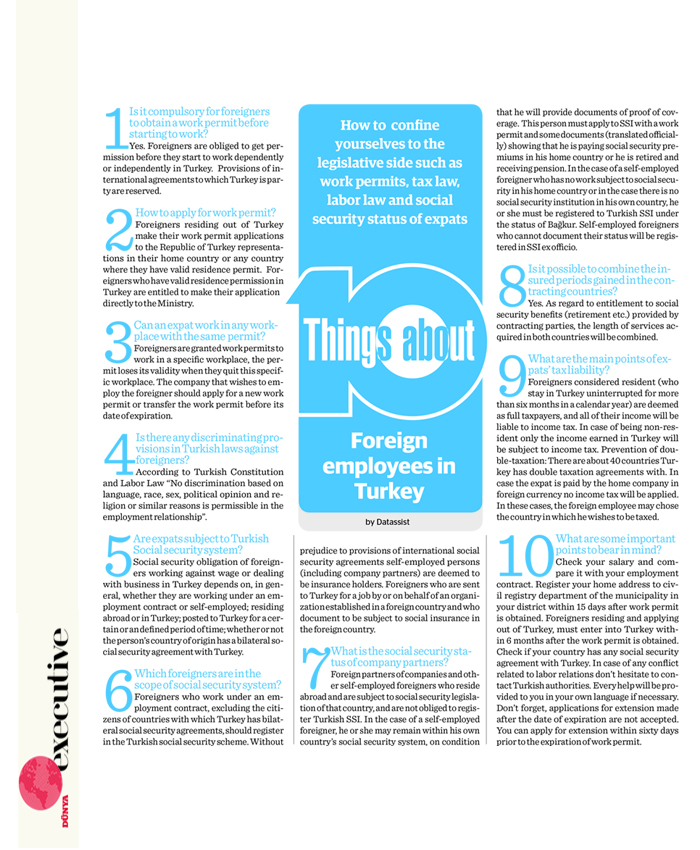
“This article is published in “Dünya Executive,” the weekly English supplement of financial newspaper Dünya, on 31st May 2017. We have tried to shed light on the problems frequently encountered by the foreigners in our country.”
Being an expat is something like an adventure involving so many problems to cope up with. That means too many questions to be answered on the matter, that’s why we are going to confine ourselves to legislative side such as work permit, tax law, labor law and social security status of expats in this article.
Permission to work in Turkey
Q. 1 – Is it compulsory for the foreigners to get work permit before starting to work?
A. 1 – Yes. Foreigners are obliged to get permission before they start to work dependently or independently in Turkey. Provisions of international agreements to which Turkey is party are reserved.
Q. 2 – How to apply for work permit?
A. 2 – Foreigners residing out of Turkey make their work permit applications to the Republic of Turkey representations in their home country or any country where they have valid residence permit.
Foreigners who have valid residence permission in Turkey are entitled to make their application directly to the Ministry.
Q. 3 – Can an expat work in any workplace with the same work permit?
A. 3 – Foreigners are granted work permits to work in a specific workplace, the permit loses its validity when they quit this specific workplace. The company who wish to employ the foreigner should apply for a new work permit or transfer the work permit before date of expire.
Principal of equality
Q. 4 – Is there any discriminating provisions in Turkish laws against foreigners?
A. 4 – According to Turkish Constitution and Labor Law “No discrimination based on language, race, sex, political opinion and religion or similar reasons is permissible in the employment relationship”.
Social Security status of Expats
Q. 5 – Are expats subject to Turkish Social security system?
A. 5 – Social security obligation of foreigners working against wage or dealing with business in Turkey depends on, in general, whether they are;
- Working under an employment contract or self-employed,
- Residing abroad or in Turkey,
- Posted to Turkey for a certain or an undefined period of time,
- The citizens of the countries Turkey has bilateral social security agreement with or not.
Q. 6 – Which foreigners are in or out of the scope of Turkish Social security system?
A. 6 –
- Foreigners who;
- work under an employment contract, excluding the citizens of countries with which Turkey has bilateral social security agreements, should register in Turkish social security scheme. (Law No 5510, Article 4.)
- Without prejudice to provisions of international social security agreements self-employed persons (including company partners) are deemed to be insurance holders.
- Foreigners who;
- are sent to Turkey for a job by or on behalf of an organization established in a foreign country and who document to be subject to social insurance in the foreign country,
- work in Turkey on his/her own name and account and reside abroad, and are subject to the social security legislation of that country, are not deemed to be insurance holders, i.e. doesn’t have to register in Turkish social security scheme. (Law No 5510, Article 6/e)
- In case of secondment/posting: In general; without prejudice to provisions of international social security agreements, foreign employees who are temporarily assigned to Turkey by and on behalf of a foreign-based company don’t need to be insured (registered on SSI) in Turkey, provided that they can prove that they are insured in their home country and the assignment doesn’t exceed 3 months.
- In case of posting between contracting countries: Turkey has bilateral social security agreements with over 25 countries. Provisions of these agreements will be applied instead of domestic legislation. Although the provisions regarding social security rights and obligations differ from country to country, the main points are as follows.
- Employed person: In case an employee is send by the employer to work temporarily on behalf of this employer in the other contracting country, that employee will continue to be subject to the legislation of sending country, on condition that posting period doesn’t exceed a certain period (i.e.24 calendar months in general) and the posting doesn’t aimed at replacing a previously posted person.
- Self-employed: In case a self-employed person temporarily transfers his business to other contracting country he will be subject to legislation of the first country, on condition that self-employed activity doesn’t exceed a certain period (i.e. 36 calendar months).
- These periods may be extended up to some periods of time depending on the agreement.
Q. 7 – What is the Social security Status of Company Partners?
A. 7 –
Foreign Partners and other self-employed:
- Foreign partners of companies and other self-employed foreigners who reside abroad and are subject to social security legislation of that country, are not obliged to register Turkish SSI.
- In case a self-employed foreigner is subject to social insurance in his home country may remain within his own country’s social security system, on condition that he will provide documents of proof. This person need to apply to SSI with work permit and some documents (translated officially) showing that he is paying social security premiums in his home country or he is retired and receiving pension.
- In case a self-employed foreigner who have no work subject to social security in his home country or in case there is no social security institution in his own country he must be registered Turkish SSI under the status of Bağkur (5510, 4/b).
- Self-employed foreigners who cannot document their status they will be registered in SSI ex officio.
Q. 8 – Is it possible to combine the insured periods gained in the contracting countries?
A. 8 – Yes. As regard to entitlement to social security benefits (retirement etc.) provided by contracting parties, the length of services acquired in both countries will be combined.
Taxation of Expats
Q. 9 – What are the main points of Expats’ tax liability?
A. 9 –
- Foreigners considered resident (who stays in Turkey uninterruptedly for more than six months in a calendar year) are deemed as full taxpayer, and all of their income will be liable to income tax.
- In case of being non-resident only the income earned in Turkey will be subject to income tax.
- Prevention of double-taxation: There are about 40 countries Turkey has double taxation agreements with. In case the expat is paid by the home company in foreign currency no income tax will be applied. In these cases foreign employee may chose the country in which he wish to be taxed.
Advices for Expats
Q. 10 – What are the some important points to bear in mind?
A. 10 –
– Check your passport validity. Foreigners whose passport validity are not 60 days longer than the expiration date of the work permit will not be allowed to enter/re-enter Turkey.
– Check your salary and compare it with your employment contract.
– Register your home address to civil registry department of the municipality in your district within 15 days after work permit is obtained.
– Foreigners residing and applying out of Turkey, must enter into Turkey within 6 months after the work permit is obtained.
– Check if your country has any social security agreement with Turkey.
– In case of any conflict related to labor relations don’t hesitate to resort to Turkish authorities. Every help will be provided to you in your own language if necessary.
– Don’t forget, applications for extension made after the date of expiration are not accepted. You can apply for extension within sixty days prior to the expiration of work permit.
 Turkish Labor Law
Turkish Labor Law



